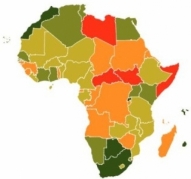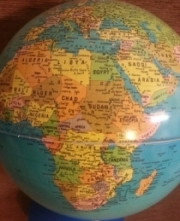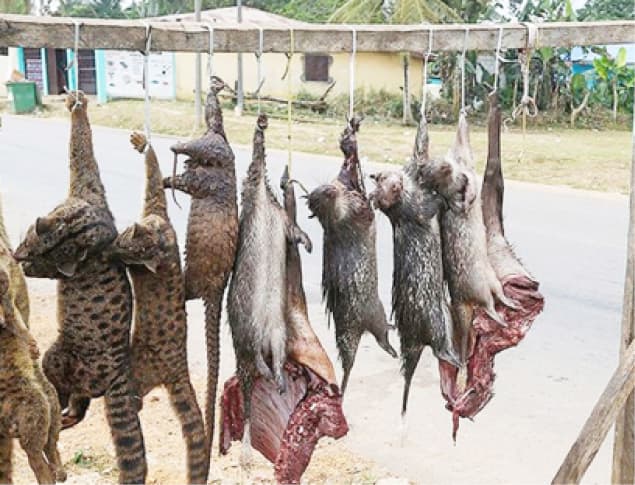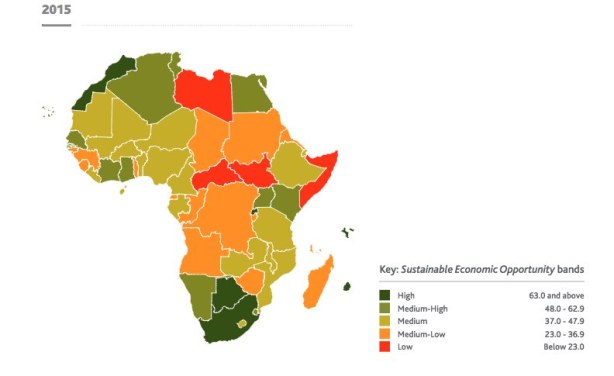The trade in wildlife particularly the killing of protected animal species and their body parts have continued to deplete their population while some have already gone into extinction for a long time.
It has been discovered that there are no surviving cheetah, rhinos, giraffes in Nigeria and less than 50 lions, 100 gorillas, 500 elephants left in the wild as a result of sustained and uncontrolled killings and trade in wild animals and their body parts.
Bushmeat brings humans into close contact with wildlife and creates a prime path for the transmission of diseases like Ebola, Lassa fever and other new emerging infectious diseases.
According to the World Health Organisation (WHO), 75 per cent of all emerging infectious diseases in the last decade originated from animals.
It revealed that outbreaks of Ebola, HIV and SARS among others have been linked to the wild or bushmeat trade, with COVID-19 also potentially spread through this activity and causing tremendous health and economic impacts.
Nigeria has flourishing unregulated bushmeat markets in major cities selling killed and live wild animals increasing close contact between the animals and humans, thereby, increasing the risks of new disease introduction and transmission.
A commercial trade serving large urban centres is said to pose significantly higher risk and larger outbreaks than subsistence use in rural areas. The 2014-2015 Ebola outbreak in West Africa killed over 11,000 people.
Several governments launched large-scale mass media campaigns to discourage people from consuming bush meat, which made consumers adjust their preferences and stay away from some bush meats like fruit bats and monkeys switching to other alternatives while bush meat sellers record poor sales during the epidemic.
Barely three years later, sales of bushmeat have rebounded in Nigeria, following the rising demand and flourishing illegal wildlife trade, which continued to thrive, fuelling trade in protected species like elephants and pangolins among others.
What the law says about trade in wild animals
The Endangered Species Act Decree No. 11 of 1986, states that the hunting or capture of or trade in animal species listed in the First Schedule to this Act is absolutely prohibited.
It also stated that no person shall hunt, capture, trade in or otherwise deal with an animal species specified in the Second Schedule to the Act except if the person is in possession of a license issued under the Act, which sets out conditions of licenses and permits.
Statistics by the International Union for Conservation of Nature’s (IUCN) Red List of threatened species in 2018 lists countries with the highest numbers of species facing the risk of extinction.
There are about 38,646 species at risk worldwide listed as endangered species and about 513 species distributed, or endemic are at risk in Nigeria as endangered species among others.
President of WildAid, Peter Knights OBE at the recent launch of a public awareness conservation campaign against illegal demand for and wildlife trade held in Lagos, disclosed that Nigeria has no surviving cheetahs, rhinos, giraffes and has fewer than 50 lions, 100 gorillas, 500 elephants and 2,300 chimpanzees left in the wild.
He said, one species like pangolins are either endangered or on the brink of extinction adding that other species declining in population include; crocodiles and antelope species like drinkers, which are widely found in bushmeat markets across the country.
In addition to bushmeat consumption, Nigeria has emerged as the primary transit hub in Africa for illegal ivory and pangolin scales trafficked to Asian countries.
He further disclosed that over half of the pangolin scales seized globally between 2016-2019, came from Nigeria.
Despite ongoing conservation efforts, poaching for body parts and meat along with habitat loss from deforestation, infrastructure development and agricultural expansion threaten wildlife in Nigeria.
A survey conducted by WildAid in January 2021 revealed that a growing appetite for bushmeat among urban residents is a growing threat to wildlife populations in Nigeria and surrounding countries as well as increases the risk of zoonotic disease transmission.
WildAid is a non-profit organisation with a mission to protect wildlife and reduce global consumption of wildlife products such as elephant ivory, rhino horn and shark fin soup among others.
The organisation believes that ‘When the buying stops, the killing can stop too.’
The consumption of bushmeat according to the survey overlaps with the illegal trade networks, fuelling the trade in protected species like elephants and pangolins.
Studies have shown that bushmeat consumption in Nigeria is influenced by a number of factors such as taste, health and culture.
It was further revealed that grasscutter (cane rat or Thryonomys swinderianus) and antelopes such as bushbuck, red-flanked duiker, bay duiker, Maxwell’s duiker, black duiker, Ogilby’s duiker, yellow-backed duiker and dwarf antelope were the most commonly eaten species.
The Endangered Species (Control of International Trade and Traffic) (Amendment) Act, 2016 and several other federal and state laws that impose penalties on hunting and trading of species like pangolins, rock pythons, elephants and some antelope species, were found to be poor deterrents on consumer behaviour.
54 per cent of consumers believed that all bushmeats are legal to buy, while 88 per cent believed that some or all bushmeat should be legal to buy.
WildAid has however launched a campaign in Nigeria to reduce demand for illegal bushmeat in major urban centres using the slogans ‘Keep them wild, keep us safe’ and ‘Poaching steals from us all’.
It was developed in partnership with the Ministry of Environment and other government agencies, the campaign stars Afrobeat artistes Davido and Mayokun, Everton FC and Nigeria footballer, Alex Iwobi, Nollywood star, Stephanie Linus, comedians Emmanuella and Josh2Funny, Mercy Jessica Odjugo (Miss Tourism Nigeria) and religious leaders from the Nigeria Inter-Religious Council (NIREC) International stars.
They include; Lupita N’yongo, Danai Gurira, Djimon Hounsou, Jackie Chan and Kung Fu Panda, which will also be featured in the campaign.
The Minister of State for Environment, Sharon Ikeazor explained that the multiplication programme is being piloted at the ministry’s outstations in Gwagwalada, FCT and Akure, Ondo State to provide an alternative to wild animals and consequently pave the way to keep them in the wild.
She said Nigeria is endowed with amazing biodiversity and houses comparable levels of endemic species due to its complex topography and a wide variety of habitats.
Ikeazor said: “These include the freshwater swamp forest, mangrove forest and coastal vegetation, lowland forest, derived savannah, guinea savannah, Sudan/Sahel savannah and montane ecosystems.
“There is also the unique vegetation of the Jos Plateau, as well as the montane vegetation of the isolated highlands of Mambilla and Obudu. Each of these ecosystems has its own unique characteristics of wild fauna, flora and a huge collection of marine and freshwater aquatic species.
Statistics show that Nigeria has an endemic flora of 91 species belonging to 44 families. According to the IUCN Red List of 2013, Nigeria has a total of 309 threatened species namely: mammals such as the pangolins, lions, elephants, manatees; birds like the grey parrots and the black-crowned crane, which is our national bird; reptiles, amphibians, fishes, molluscs and plants such as costus spectabilis, our national plant.
“Some of our biodiversity sites include the seven national parks including Old Oyo, Cross River, Gashaka-Gumti, Okomu, Chad Basin, Kainji Lake, and Kamuku); 27 Important Bird Areas, which are found in all our National Parks, as well as 60 per cent of our eleven Ramsar Sites such as the Hadejia-Nguru; two World Heritage Sites of Sukur Kingdom and Osun Osogbo Grove; 994 forest reserves in the 36 states of Nigeria; and 32 game reserves among others.”
The minister emphasized that biodiversity plays a vital role in the nation’s economy, ecology and social lives as they are used as food, fibre, domestic and commercial products, medicine, and for aesthetics and culture, agriculture, knowledge, and industrial processes; she noted that human survival and overall wellbeing depends on how sustainably the environment and its biodiversity are managed.
She however lamented that serious environmental challenges have also led to the loss of biodiversity and threaten human existence.
Ikeazor added: “The alarming rate of over-exploitation of these natural resources calls for urgent, increased and proactive actions to reverse this trend. Poaching, possessing, taking, trading (supply or selling) and consumption have put Nigeria in the spotlight of wildlife crime.
“We are all culprits of bushmeat consumption as it is a phenomenon in both rural and urban communities, posing environmental risks and extinction of threatened species. In-country and trans-border trafficking is quite alarming, and Nigeria has been tagged a “Transit Hub” for this illegality.
“The phenomenon also constitutes high-security risk, public health risk with the spread of zoonotic diseases such as Lassa Fever, Ebola Virus, and recently COVID-19,” she said, saying, collaborative efforts with organizations such as WildAid would help to address this menace.
Lagos State Commissioner for Health, Prof. Akin Abayomi said that humanity can no longer stand by in silence while the animal and plant resources in the forest and other biomes are being exploited, abused and depleted.
He said: “Every day, countless rare plant and animal species go into extinction. Destruction of all types of ecosystems and lack of wildlife conservation measures is a serious biosecurity threat that leads to an increase in the likelihood of natural disasters, global warming and a significant change in good production.
“Overexploitation of wildlife for eating and illegal trafficking is one of the biggest threats to biodiversity loss in Nigeria. Nigeria is also a major player in the global illegal wildlife trafficking as illegal trade is decimating populations of elephants, pangolins, rhinoceros, sharks, chimpanzees, gorillas and numerous tree species in Nigeria.”
Also commenting on the consequences of deforestation and wildlife loss in Nigeria, Professor Abayomi emphasised that the increase in dangerous and deadly infectious diseases such as Ebola, COVID-19 and Lassa fever can be directly or indirectly linked to the animal kingdom.
According to him, research has shown that 60 per cent of existing infectious diseases are zoonotic while 80 per cent of the zoonotic pathogens with the potential to be weaponised.
He added that the forest serves as a major source and raw material for most indigenous and orthodox drugs worldwide saying deforestation will lead to loss of important tress of medicinal properties that can be used to cure most tropical diseases.
He stressed the need to stand together and speak against environmental degradation and wildlife destruction in Nigeria before it is too late. “Extinction means forever,” he said.
Dear Reader,
Every day, we work hard to provide readers such as you with the most accurate, up-to-date, and comprehensive information. Quality journalism costs money. Today, we're asking that you support us to do more. Your support means that Daily Trust can keep offering journalism to everyone in the world. sign up for as little as N1,000 to become a member. Learn more about our membership here





